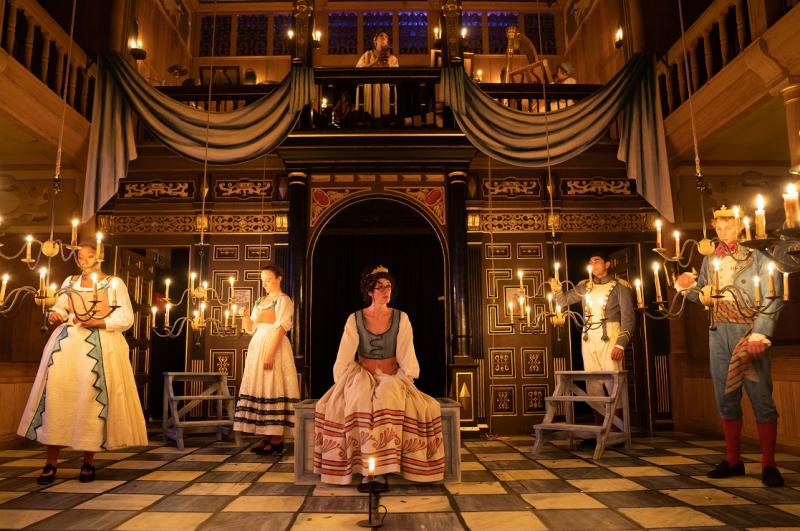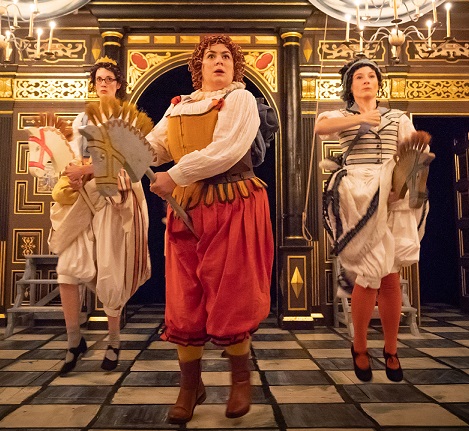Love's Labour's Lost, Sam Wanamaker Playhouse review - in praise of a fantastical Spaniard | reviews, news & interviews
Love's Labour's Lost, Sam Wanamaker Playhouse review - in praise of a fantastical Spaniard
Love's Labour's Lost, Sam Wanamaker Playhouse review - in praise of a fantastical Spaniard
The ladies of France shine in a production that otherwise makes over-emphatic weather

If ever there was a play of “well bandied” words, it’s surely Love’s Labour’s Lost.
So it’s to the credit of Nick Bagnall’s new production that the Playhouse audience clearly comes away on an upbeat note. And that’s despite that perplexing final scene, one that disrupts the traditional marriage ending (“our wooing doth not end like an old play”), even if Bagnall’s cast of eight still go out on a dance that closes proceedings as if all was rather sunnier.
 It takes quite a degree of condensing leverage to bring the players down to that number. That Shakespeare’s quartet of lovers becomes a trio – and so farewell, Longaville, Maria – may not count for much, given that Berowne is the courting courtier whose loquacity captivates (though Dharmesh Patel’s delivery doesn't: greater enunciation would be welcome). It’s more of a loss that the role of Costard is divided between cast members, with a loss of comic consistency, though costuming maintains identity. Jaquenetta is doubled, too, which makes for some quick changes, but Jade Williams (also Rosaline) is as agile as any of the players here in an action that nimbly reaches out well into the auditorium.
It takes quite a degree of condensing leverage to bring the players down to that number. That Shakespeare’s quartet of lovers becomes a trio – and so farewell, Longaville, Maria – may not count for much, given that Berowne is the courting courtier whose loquacity captivates (though Dharmesh Patel’s delivery doesn't: greater enunciation would be welcome). It’s more of a loss that the role of Costard is divided between cast members, with a loss of comic consistency, though costuming maintains identity. Jaquenetta is doubled, too, which makes for some quick changes, but Jade Williams (also Rosaline) is as agile as any of the players here in an action that nimbly reaches out well into the auditorium.
However, it’s Jos Vantyler as Don Armado (pictured above left) who really steals the limelight, and his comic braggadocio energy overcomes (largely) a lingering sense of cultural dodginess about the portrayal of this “fantastical Spaniard”, one that certainly plays up to present-day tropes. If it wasn’t enough that he gets plenty of contempo interpolations – a rendition of “To All the Girls I Loved Before” included – Bagnall has also given him responsibility for playing his own servant, Moth. That might easily sound like a gimmick, but the way Vantyler accomplishes it – like he’s talking down to a diminutive, invisible puppet, then replying to himself in a squeaky Yorkshire accent – is actually enormously engaging, and the actor deserves the round of applause he gets for the moment when he’s even triple-playing roles.
The distaff side of the cast not only outwits the male suitors but roundly outplays them
Whether it leaves the audience simply baffled, at least until they twig the japery, is another matter (let’s face it, Love’s Labour’s is not a text many of us have ever actually gained). And japery – “not a word but a jest” – is key to the interaction across the sexes that’s on display here. The distaff side of the cast not only outwits the male suitors, whose opening renunciation of the pursuits of love for study is made with all the conviction of reading the meter, but roundly outplays them: “We are wise girls that mock our lovers so”, indeed. That’s right across the board, from Kirsty Woodward as a bookish Princess of France and Jade Williams as Rosaline, to Charlotte Mills as Boyet (pictured below, front, with Kirsty Woodward, Jade Williams), whose gender-swap here seems to prove that women really do multi-task better.
Because when Tom Kanji (Dumaine) and Paul Stocker, as the King of Navarre, do so in their doubling as Sir Nathaniel and Holofernes respectfully, the effect is groanworthy. Which, in fairness, it has to be, both from the text itself, and no less for how it fits into this production, something also illustrated by the trio’s ripely ham appearance in Muscovite disguise. Presenting the Pageant of the Nine Worthies, another element that creaks anywhere, when you’re at least a man down was always going to be a push.
 There’s nowt wrong with a romp, of course, though you’re left with the impression that the place for this one might have been the wide-open space of the Globe’s main stage. But Bagnall’s production, with its conceit that the action unfolds from within the Princess of France’s dressing-up trunk and other elements more suited to the gilded finery of the Playhouse, rather falls between two stools. There are music-box allusions too, and co-composers James Fortune and Laura Moody offer a rather lovely score, albeit one that sometimes seems to have only tenuous relation to what’s going on beneath the musicians’ balcony.
There’s nowt wrong with a romp, of course, though you’re left with the impression that the place for this one might have been the wide-open space of the Globe’s main stage. But Bagnall’s production, with its conceit that the action unfolds from within the Princess of France’s dressing-up trunk and other elements more suited to the gilded finery of the Playhouse, rather falls between two stools. There are music-box allusions too, and co-composers James Fortune and Laura Moody offer a rather lovely score, albeit one that sometimes seems to have only tenuous relation to what’s going on beneath the musicians’ balcony.
Not least because it’s such a rarely staged play, memories of Christopher Luscombe’s RSC production (double-billed with Much Ado) are fresh; if that one left behind anything, it was a sense of wider spaces, broader characters, more evocative perspectives. This is a Love’s Labour’s played for reductio effect, its mental as well as physical japes marked up too much to reveal any more subtle skein of emotion.
rating
Explore topics
Share this article
The future of Arts Journalism
You can stop theartsdesk.com closing!
We urgently need financing to survive. Our fundraising drive has thus far raised £49,000 but we need to reach £100,000 or we will be forced to close. Please contribute here: https://gofund.me/c3f6033d
And if you can forward this information to anyone who might assist, we’d be grateful.

Subscribe to theartsdesk.com
Thank you for continuing to read our work on theartsdesk.com. For unlimited access to every article in its entirety, including our archive of more than 15,000 pieces, we're asking for £5 per month or £40 per year. We feel it's a very good deal, and hope you do too.
To take a subscription now simply click here.
And if you're looking for that extra gift for a friend or family member, why not treat them to a theartsdesk.com gift subscription?
more Theatre
 Troilus and Cressida, Globe Theatre review - a 'problem play' with added problems
Raucous and carnivalesque, but also ugly and incomprehensible
Troilus and Cressida, Globe Theatre review - a 'problem play' with added problems
Raucous and carnivalesque, but also ugly and incomprehensible
 Clarkston, Trafalgar Theatre review - two lads on a road to nowhere
Netflix star, Joe Locke, is the selling point of a production that needs one
Clarkston, Trafalgar Theatre review - two lads on a road to nowhere
Netflix star, Joe Locke, is the selling point of a production that needs one
 Ghost Stories, Peacock Theatre review - spirited staging but short on scares
Impressive spectacle saves an ageing show in an unsuitable venue
Ghost Stories, Peacock Theatre review - spirited staging but short on scares
Impressive spectacle saves an ageing show in an unsuitable venue
 Hamlet, National Theatre review - turning tragedy to comedy is no joke
Hiran Abeyeskera’s childlike prince falls flat in a mixed production
Hamlet, National Theatre review - turning tragedy to comedy is no joke
Hiran Abeyeskera’s childlike prince falls flat in a mixed production
 Rohtko, Barbican review - postmodern meditation on fake and authentic art is less than the sum of its parts
Łukasz Twarkowski's production dazzles without illuminating
Rohtko, Barbican review - postmodern meditation on fake and authentic art is less than the sum of its parts
Łukasz Twarkowski's production dazzles without illuminating
 Lee, Park Theatre review - Lee Krasner looks back on her life as an artist
Informative and interesting, the play's format limits its potential
Lee, Park Theatre review - Lee Krasner looks back on her life as an artist
Informative and interesting, the play's format limits its potential
 Measure for Measure, RSC, Stratford review - 'problem play' has no problem with relevance
Shakespeare, in this adaptation, is at his most perceptive
Measure for Measure, RSC, Stratford review - 'problem play' has no problem with relevance
Shakespeare, in this adaptation, is at his most perceptive
 The Importance of Being Earnest, Noël Coward Theatre review - dazzling and delightful queer fest
West End transfer of National Theatre hit stars Stephen Fry and Olly Alexander
The Importance of Being Earnest, Noël Coward Theatre review - dazzling and delightful queer fest
West End transfer of National Theatre hit stars Stephen Fry and Olly Alexander
 Get Down Tonight, Charing Cross Theatre review - glitz and hits from the 70s
If you love the songs of KC and the Sunshine Band, Please Do Go!
Get Down Tonight, Charing Cross Theatre review - glitz and hits from the 70s
If you love the songs of KC and the Sunshine Band, Please Do Go!
 Punch, Apollo Theatre review - powerful play about the strength of redemption
James Graham's play transfixes the audience at every stage
Punch, Apollo Theatre review - powerful play about the strength of redemption
James Graham's play transfixes the audience at every stage
 The Billionaire Inside Your Head, Hampstead Theatre review - a map of a man with OCD
Will Lord's promising debut burdens a fine cast with too much dialogue
The Billionaire Inside Your Head, Hampstead Theatre review - a map of a man with OCD
Will Lord's promising debut burdens a fine cast with too much dialogue

Add comment